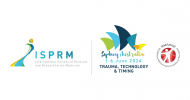Session outline
This workshop aims to discuss the military-civilian rehabilitation partnership in the UK, highlighting its history and contrasting modern approaches between the two sectors. By drawing on the experience of the Defence and National Rehabilitation Centre (DNRC), this workshop will explore how military and civilian rehabilitation systems can mutually benefit from each other through formal partnerships.
Access to rehabilitation is a global challenge, particularly in low and middle-income countries where responsibility for rehabilitation varies across sectors outside of national health systems. The World Health Organisation’s Rehabilitation 2030 initiative recognises this issue and calls for improved integration of rehabilitation into the health sector, strengthening intersectoral links to meet population needs more effectively.
While collaboration between military and civilian health sectors is common globally, it has primarily focused on developing wartime skills during peacetime trauma care. However, there has been limited emphasis on collaboration in rehabilitation except for specific research projects targeting conditions like mild Traumatic Brain Injury. The COVID-19 pandemic highlighted how civilian health systems can benefit from military expertise, despite differences in injury mechanisms, outcomes, comorbidity factors that may influence approaches to rehabilitation.
Military and civilian rehabilitation services often differ in structure, resourcing, intensity, goals as well as encounter different disabling conditions. This creates challenges during transitions from military to civilian services..
Recognising these challenges presents an opportunity for mutual benefits through civil-military partnerships in rehabilitating individuals. In the UK specifically, progress is being made with initiatives like the Defence and National Rehabilitation Centre program based at Stanford Hall—a national centre of excellence co-locating defence and NHS rehab centres for enhanced collaboration on research and education.
The workshop will delve into differences between inclusion criteria, content of programs offered by both sectors along with technology used while considering whether applying defence programs to the civilian population is meritorious, feasible, and cost-effective. By exploring these aspects, participants will gain valuable insights into how military-civilian partnerships can enhance rehabilitation services for both sectors.
Furthermore, this workshop acknowledges the global challenge of limited access to rehabilitation and the need for integration into health sectors. By examining military-civilian partnerships in rehabilitation, valuable lessons can be learned on collaboration models that can be adapted globally to improve access and quality of care as emphasised by the World Health Organisation’s Rehabilitation 2030 initiative.
Learning outcomes
- Historical development of rehabilitation services in the UK NHS and MoD
- Current model and structure of rehabilitation services in the UK NHS and MoD
- Differences between the NHS and MoD and implications for clinical rehabilitation services
- Administrative, governance and security challenges affecting DMRC and NRC collaboration
- Lessons learned from the DNRC project
- Military and civilian rehabilitation in lower or middle income countries
- Sharing of international delegate experience on military vs civilian rehabilitation
- International opportunities for collaboration between military and civilian rehabilitation services
- Principles of Military-civilian rehabilitation partnerships and implications for global rehabilitation
Target audience
- Allied health
- Medical practitioners
- Students
- Trainees
- Nursing staff
- General public



